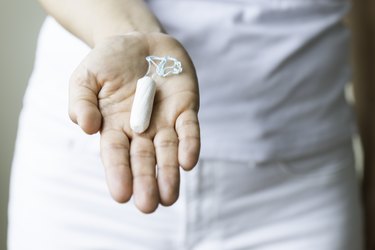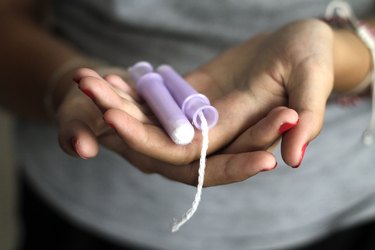
When Aunt Flo makes her monthly visit, some people prefer pads, while other swear by menstrual cups or tampons. But no matter what your period product preference, you shouldn't be worried about whether it can harm your health.
Which is why you might be alarmed by recent claims on social media about tampons. Some are alleging that a common ingredient found in many tampon brands called titanium dioxide can cause excessive bleeding, infertility and even cancer.
Video of the Day
Video of the Day
We spoke to ob-gyn James A. Gohar, MD, co-founder and CEO of Viva Eve, to set the record straight on this substance in question, including whether it poses any risk to your reproductive health (or otherwise) and which tampon products are safest.
What Is Titanium Dioxide and Why Do Some Tampons Contain It?
"Titanium dioxide is a naturally occurring substance that is often used in food and other topical products to create a whiter and brighter look," Dr. Gohar says.
Indeed, this white pigment lightens everything from paints, paper coatings and plastics to sunscreen, pharmaceutical tablets, flours and dairy products, according to the National Library of Medicine.
And it functions the same in tampons: Titanium dioxide serves as a coloring agent to make your period products appear whiter, Dr. Gohar says.
Is Titanium Dioxide Safe?
Well, that depends.
"According to the U.S. Food and Drug Administration (FDA), regulated doses of titanium dioxide are not harmful, but this also varies based on use," Dr. Gohar says.
Typically, "higher doses can be used topically in a safe manner," he says. For example, when the substance is applied via sunscreen, sufficient data have found titanium dioxide to be "generally recognized as safe and effective," per the FDA.
However, larger quantities of titanium dioxide might be damaging if ingested, Dr. Gohar says.
In fact, in 2021 the European Food Safety Authority (EFSA) declared titanium dioxide no longer safer as a food additive. The decision was based on available scientific research which, although not totally conclusive, found that an accumulation of titanium dioxide in the body could possibly contribute to genotoxicity (i.e., damage at the DNA level that may lead to cancer).
The chemical substance also seems to have a potentially negative impact on the gut microbiome, Dr. Gohar says. Case in point: exposure to titanium dioxide may destroy good gut microbes, cause gut dysfunction and increase intestinal inflammation, according to a February 2021 systematic review of animal studies published in the International Journal of Environmental Research and Public Health.
Still, more studies in humans need to be performed to verify this finding.
And as of March 2022, the FDA maintains its position that titanium dioxide may be safely used as a food coloring.
But titanium dioxide's possible deleterious effects extend beyond ingesting it. Inhaling titanium dioxide may also result in adverse respiratory reactions, Dr. Gohar says.
When inhaled repeatedly, this white powder can irritate the lungs, causing problems like bronchitis or even lung cancer, as it's been shown to be a known carcinogen in animals, according to the New Jersey Department of Health.
OK, so what about titanium dioxide in tampons, which sit inside you for hours at a time?
"There are no published studies on titanium dioxide causing excessive bleeding, infertility or cancer, so it is hard to say if it is dangerous to women's health or not," Dr. Gohar says.
Plus, titanium dioxide is not water soluble, so it's unlikely to be dissolved and absorbed vaginally, according to the National Library of Medicine.
That said, with all the scientific evidence accumulating in other areas, consumers should be more aware of titanium dioxide's potential effect on reproductive health, Dr. Gohar says.
How Can You Tell if Your Tampons Contain Titanium Dioxide?
"Most tampons list their ingredients on the back of the package," Dr. Gohar says.
But if you don't see the word titanium dioxide, that doesn't necessarily mean the chemical isn't in your tampons. Here's why: sometimes the substance is also noted as "Pigment White 6" or "White Pigment," Dr. Gohar explains.
Should You Stop Using Tampons Containing Titanium Dioxide?
"Again, the data is inconclusive on whether these products are really linked to excessive bleeding, cancer and infertility, so it's not right or wrong to continue using these products based on currently available information," Dr. Gohar says.
Bottom line: "When it comes to period products, the priority should be using products that you feel comfortable with and are accessible to you," he says.
"So, if titanium dioxide is giving you anxiety that you just can't shake," there are plenty of period care products and trustworthy tampon brands you can try without the chemical, Dr. Gohar says.
Try These OB-GYN-Recommended, Titanium Dioxide-Free Period Products
- Rael Organic Cotton Tampons ($13.99 for a 32-count box on Amazon.com)
- August Tampons ($11 for a 16-count box on Itsaugust.co)
- Diva Cup ($39.99 for one menstrual cup on Divacup.com)
- National Library of Medicine: “Titanium dioxide”
- U.S. Food and Drug Administration: “Questions and Answers: FDA posts deemed final order and proposed order for over-the-counter sunscreen”
- European Food Safety Authority: “Titanium dioxide: E171 no longer considered safe when used as a food additive”
- U.S. Food and Drug Administration: “Code of Federal Regulations Title 21”
- New Jersey Department of Health: “Hazardous Substance Fact Sheet: Titanium Dioxide”
- International Journal of Environmental Research and Public Health: “Impact of Food Additive Titanium Dioxide on Gut Microbiota Composition, Microbiota-Associated Functions, and Gut Barrier: A Systematic Review of In Vivo Animal Studies”
Is this an emergency? If you are experiencing serious medical symptoms, please see the National Library of Medicine’s list of signs you need emergency medical attention or call 911.


